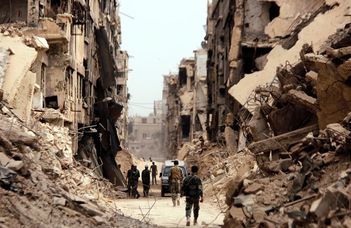The Other Side of the Syrian Civil War

Based on several years of fieldwork in Syria since 2012, the two consecutive lectures look back at the political and social situation in the territories beyond the control of the Syrian government.
Time: 25 April 2024, 14.00-18.00
Venue: ELTE Faculty of Humanities, Building D, room 126. (map)
► Patrick Haenni: The Silent Revolution: Political and Doctrinal Transformations of Hayʾat Taḥrīr al-Shām in Syria
This presentation endeavours to elucidate the evolutionary dynamics experienced by the former al-Qaeda branch in Syria from 2017 to 2023. Its primary assertion revolves around the notion that the transformation unfolded without substantial ideological revisions (murājaʿāt). Instead, it transpired through an extensive process of successive tactical adaptations, primarily tailored to the local milieu. This cumulative adjustment, over time, gave rise to a novel strategic landscape. Its secondary argument focuses to the conceptualization of this adaptive process as "relocalisation." This term not only encapsulates the severance of ties with formal global jihad networks but also encompasses a transactional engagement with local realities, including interactions with elites, worldviews, and religious representations. Importantly, this relocalisation engenders a dynamic that Haenni labels "deradicalisation." The presentation will delve into the intricacies of the transformation dynamics, placing particular emphasis on the religious dimensions. Simultaneously, it will explore the "endgame" – the current phase of the movement. Additionally, it will introduce relevant conceptual frameworks developed to precisely characterise this stage.
Patrick Haenni holds a PhD in political sociology, Paris, Institut d'Etudes Politiques and is a research associate at the European University Institute (EUI). Since 2013, his work has focused on political dynamics in rebel-controlled areas of Syria. He is the author of L'Islam de marché (Paris, Seuil, 2005), L'Ordre des Caïds (Paris, Karthala, 2005), Les Minarets de la discorde (Fribourg, Religioscope, 2009).
► Arthur Quesnay: Sociological Approach of the Stabilizing Process in Islamic State’s Liberated Territories in North-East Syria
While the construction of local roots by armed movements has become a recurrent theme of research in the sociology of armed conflicts, it remains an unknown factor in the stabilization phase of the territories taken over by the self-styled Islamic State. Firstly, the period of IS occupation remains largely unexplored. Commonly described as fanatic, the Islamic State is still a political enigma. Indeed, the behavior of its militants, its relationship with society are puzzling. Why impose with such extreme brutality a social order that undermines the economic and demographic bases of the caliphate they intend to impose? What is the logic of a movement which, in a situation of strategic emergency, alienates potential supporters by such amount of violence? Secondly, the reconquest phase undertaken by Kurdish forces and the international coalition ends in 2019, but opens up the question of rebuilding a solid local base for the new power. Numerous interviews in towns such as Raqqa and Karama enable us to analyze how local networks are being rebuilt by the Kurdish Autonomous Administration. This presentation focuses on the governorate of Raqqa and the province of Dayr al-Zawr, two hotbeds of mobilization for IS, but also two examples of how the stabilization phase is unfolding. Based on several years of field research since 2015, the aim is to understand how the mechanisms of mobilization and demobilization of IS fighters evolve. This raises the question of how Kurdish forces are governed, and their ability to build institutions in a period of civil war.
Arthur Quesnay holds a doctorate in political science and is affiliated at Sorbonne University (Paris-1, CESSP). Since 2009, his research has focused on Iraq and Syria. He has published La Guerre Civile Irakienne (Karthala, 2021) and co-authored with Adam Baczko and Gilles Dorronsoro, Civil war in Syria. Mobilization and competing social orders (Cambridge University Press, 2018).

